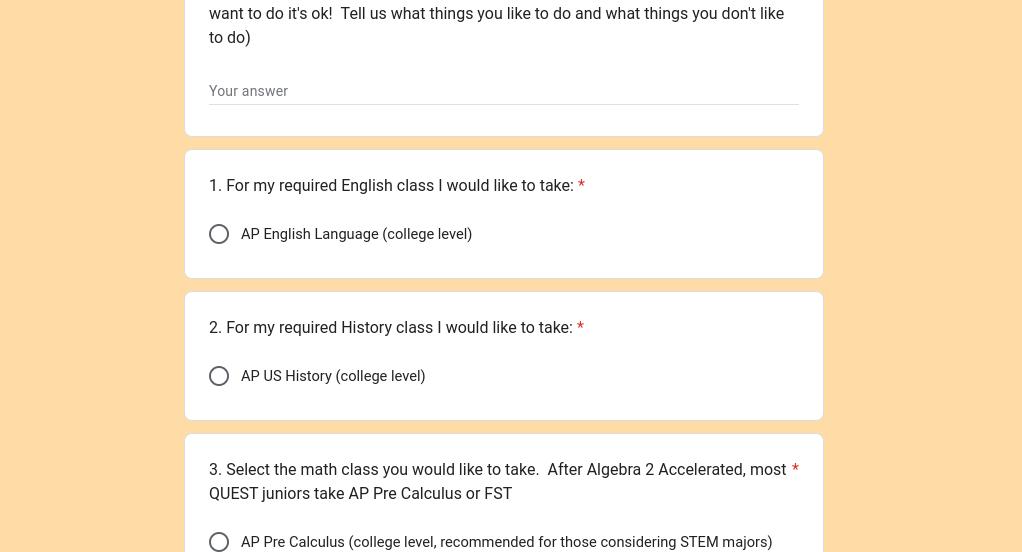
Arianna Garcia
Photo of what the form looks like when QUEST Sophomores are selecting their courses for Junior year.
Millikan offers over 20 Advanced Placement (AP) courses for students to choose from. These classes are college-level courses designed to supply students with the experience and offer opportunities for students to earn college credit for a fraction of the price (Students are only required to pay a five-dollar fee if they are taking the test) while in high school.
AP courses are commonly offered to students prepared for rigorous material but are available to all students if counselors, teachers, and other trusted adults, and the student feels they are ready.
All pathways require an AP course/dual enrollment course to earn a pathway medallion at graduation. Unlike any other pathway, QUEST is the only pathway that requires its students to take multiple AP courses (a minimum of five) before graduation to earn their pathway medallion (a decorative medal worn at graduation to symbolize the graduates pathway).
Through my research, I found a common misconception of the word “requirement” in graduation.
QUEST Sophomore, Camila Hernandez said, “Yeah I think they [the required AP classes] are for graduation, but I am not sure.” She is not alone in this mindset.
Ryden Kim, a QUEST freshman, similarly believed he was forced into taking these courses to be able to graduate and although he was ready to face the classes head-on, he still appreciated the weight that was lifted off his shoulders when he realized he had a choice.
Owen Waytas, a junior in QUEST, feels students should not be put into classes they do not feel ready for.
“We [QUEST students] don’t get the choice between AP and regular history [in sophomore, junior, and senior year] so I think it would be very helpful for some of the students who do not want to take a hard history class, to have an option,” said Waytas.
Of course, Dual Enrollment is an option if a student decides they do not want to take an Advanced Placement course throughout the school year. At the end of the day, these are still rigorous courses that will challenge students.

Ms. Barragan, the counselor for QUEST grades 10-12, explained that when she started at Millikan in 2003, certain AP classes were offered only to QUEST students.
“The skills that you get in a course like that [AP English Language], the rhetorical, the critical thinking, the writing skills, those are all things that college students need to have and if you do that class, you are so much more prepared for college so I think it is absolutely fine to require that course,” said Barragan.
What caught my attention after speaking with Ms. Barragan and various QUEST students was that many students are not aware of their alternatives.
Do I have to take five AP classes? Why do I only have one option for History for sophomore, junior, and senior year? Can I transfer to a regular history class? What is dual enrollment? If I choose to not take five APs will I not be allowed to graduate? Are our answers out there somewhere or is it just a lack of information?
Maybe this information is given and maybe there are simple answers to these. But speaking for myself and many students I have conversed with, we are unsure of where to find our answers. I urge the adults on campus to reach out and help us get more information in ways that are convenient to students.
In the end, students who decide to get into the QUEST pathway are goal-driven scholars who will rise to the challenge, but they should not be penalized or stripped of their gold robe in a course they do not enjoy for a decision they made before entering the new high school environment, especially without being given all the information necessary.